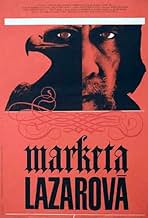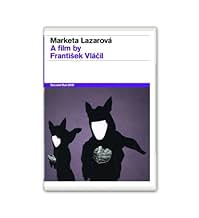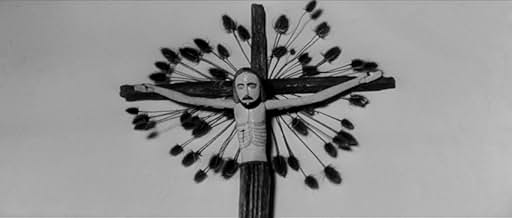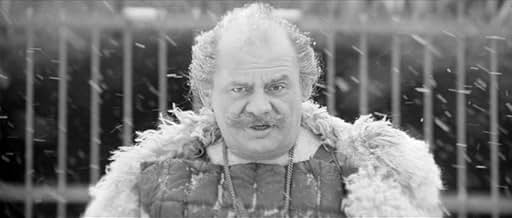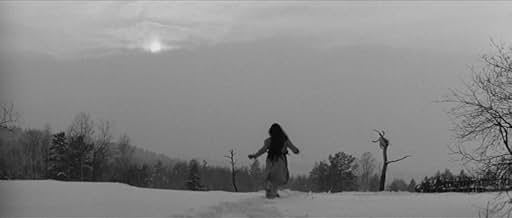NOTE IMDb
7,8/10
6,5 k
MA NOTE
Un portrait sombre du passage du paganisme au christianisme dans la Tchécoslovaquie médiévale où une jeune vierge promise à Dieu est enlevée et violée par un maraudeur que son père pieux che... Tout lireUn portrait sombre du passage du paganisme au christianisme dans la Tchécoslovaquie médiévale où une jeune vierge promise à Dieu est enlevée et violée par un maraudeur que son père pieux cherche alors à tuer en représailles.Un portrait sombre du passage du paganisme au christianisme dans la Tchécoslovaquie médiévale où une jeune vierge promise à Dieu est enlevée et violée par un maraudeur que son père pieux cherche alors à tuer en représailles.
- Réalisation
- Scénario
- Casting principal
- Récompenses
- 2 victoires et 2 nominations au total
Avis à la une
I've only seen this movie once, in a restored print at a film festival a few years back; it's apparently not available on video in the US, which is a real shame. It's a medieval epic, basically about the clash between the old pagan world and the emerging Christian one, but there's a lot more to it than that. Visually, it's nearly as stunning as *Andrei Rublev* (and a good bit faster-paced); some of the images - wolves roaming the barren forests, horsemen in snowstorms - will make the hairs on the back of your neck stand up. I'll admit that I'm a sucker for gloomy, wintry European art movies, especially if they work some bloody sword-fights in, too, but this is one of the overlooked Great Movies ...
I bought the Second Run DVD, after reading about how this epic was considered the best Czech film, ever.
To be honest, not many other contenders spring to mind. And, who voted? As it was on special offer and I am a sucker indeed for that Russian style of gritty monochrome composition and beauty, how could I resist?
I'm on its second play and I'm no nearer following the story. There is undoubtedly one. Am I too overawed by imagery that I could only dream of? (even if I were able to!) Is it the savagery and feel of a certain reality?
I don't know. I can sense, however, an art film made with passion and unbounded imagination. Of folklore, both in a historical sense and a cultural one and of religious rebellion. Like Kurosawa at his best, an immediacy and connection. Yet, it is also dreamlike and distant, with an air of mysticism that I found increasingly confusing. The length of film means that by halfway through I've no idea what is going on, but am still enjoying what I see.
Unfortunately, I have docked a mark for the forced, electronically induced echo on the dialogue that probably is supposed to denote that other worldly strangeness. It seems to seep in and hang about, its constant use here cheapens the effect to being a bit of a pain. Whereas Kurosawa used that SFX so effectively on, say Roshomon, by using just once or twice.
I could see elements of the Brazilian 'Black God, White Devil' and like others have commented, Kurosawa's 'Seven Samurai' and Tarkov's 'Andrei Rublev'. Maybe some of the black magic in Bergman's late medieval classics, such as 'The Virgin Spring' and 'The Seventh Seal'. But more psychotic, more manic and disturbing than all these put together. Like madness itself, there is a real beauty deeply ingrained amongst the mayhem.
My conclusion would have to be that if you get the chance, go for it. Take it with a large pinch of salt and sprinkle sparingly. None of it is truly horrific or unpalatable to most adults and don't worry if you don't "get it". Be slightly proud and immodest that you've found a tarnished gem that hardly anyone else will have seen or are ever likely to.
To be honest, not many other contenders spring to mind. And, who voted? As it was on special offer and I am a sucker indeed for that Russian style of gritty monochrome composition and beauty, how could I resist?
I'm on its second play and I'm no nearer following the story. There is undoubtedly one. Am I too overawed by imagery that I could only dream of? (even if I were able to!) Is it the savagery and feel of a certain reality?
I don't know. I can sense, however, an art film made with passion and unbounded imagination. Of folklore, both in a historical sense and a cultural one and of religious rebellion. Like Kurosawa at his best, an immediacy and connection. Yet, it is also dreamlike and distant, with an air of mysticism that I found increasingly confusing. The length of film means that by halfway through I've no idea what is going on, but am still enjoying what I see.
Unfortunately, I have docked a mark for the forced, electronically induced echo on the dialogue that probably is supposed to denote that other worldly strangeness. It seems to seep in and hang about, its constant use here cheapens the effect to being a bit of a pain. Whereas Kurosawa used that SFX so effectively on, say Roshomon, by using just once or twice.
I could see elements of the Brazilian 'Black God, White Devil' and like others have commented, Kurosawa's 'Seven Samurai' and Tarkov's 'Andrei Rublev'. Maybe some of the black magic in Bergman's late medieval classics, such as 'The Virgin Spring' and 'The Seventh Seal'. But more psychotic, more manic and disturbing than all these put together. Like madness itself, there is a real beauty deeply ingrained amongst the mayhem.
My conclusion would have to be that if you get the chance, go for it. Take it with a large pinch of salt and sprinkle sparingly. None of it is truly horrific or unpalatable to most adults and don't worry if you don't "get it". Be slightly proud and immodest that you've found a tarnished gem that hardly anyone else will have seen or are ever likely to.
"Marketa Lazarova" was a film I saw in 1970 at a small film theater in Minneapolis, Minnesota. It left an indelible memory, and I've spent years trying to find a way to see it again. At least once a year, I find a note I left about a phone call I've made to some obscure library or other such place in the hope of finding a way to see it.
The film won an Academy Award, and it should be remembered. It is stunning in black and white; the story is remarkable in its content and direction.
If anyone has ideas about how we fans can possibly revive this movie, we should try to do so. It is worth all the trouble and more just to see it again and again.
The film won an Academy Award, and it should be remembered. It is stunning in black and white; the story is remarkable in its content and direction.
If anyone has ideas about how we fans can possibly revive this movie, we should try to do so. It is worth all the trouble and more just to see it again and again.
UK DVD label Second Run which specializes in rare Eastern European classics have, over the last couple of years, released a handful of films I have long yearned to watch (and which, as a result of this viewing of MARKETA LAZAROVA, I've just ordered online): Aleksander Ford's KNIGHTS OF THE TEUTONIC ORDER (1960; a disc which despite its being trimmed by the BBFC and in an altered aspect ratio, I couldn't sensibly forego), Jerzy Kawalerowicz's MOTHER JOAN OF THE ANGELS (1961; their very first release which I purchased in London last year), Jan Nemec's THE PARTY AND THE GUESTS (1966) and, debuting in a few days' time, Miklos Jancso's THE ROUND-UP (1965).
Unlike these movies, I wasn't consciously aware of MARKETA LAZAROVA when the infectious buzz about its impending release hit the Internet but, as I later found out, the film was actually mentioned, ever so fleetingly, in one of my father's old movie magazines. Again, when the DVD was eventually released, there was a negative vibe about the alleged visual deficiencies of Second Run's disc but, in hindsight, these were quite needlessly exaggerated. Ultimately, an awesome and, as it turned out, essential movie experience such as this one deserves to be seen right away and to keep waiting for that perfectly pristine print to rear its unlikely head is utterly pointless. Alas, the Czech New Wave is still a largely undiscovered segment of cinema history for me so I am not in a position to suitably assess whether MARKETA LAZAROVA is indeed the greatest Czech movie ever made (as it had been judged in a 1998 poll among 100 native film critics). Suffice it to say that this ostensibly obscure film has by now figured in a number of published all-time best polls and, consequently, its status is deservedly well-established. Hopefully, as it was in my case, Second Run's DVD will serve as the introduction to many an adventurous film enthusiast in the future
Since my overall experience of MARKETA LAZAROVA was such a positive one, it seems only right to get my quibbles with the film out of the way first and there are basically two of them: a muddled storyline which, for most of the film's first half, left me rather perplexed as to which of the two warring factions the characters whose exploits I was following on screen belonged and, while things got clearer as time went by, the individuals themselves (with the obvious exception of the titular character) did not exactly garner much sympathy. I suppose that for a movie with a running time of almost three hours these flaws would usually be significantly detrimental to one's enjoyment of the whole: however, the definite impression I was left with while watching was that, despite the eponymous title, the director's intent was not to narrate a conventional life history but actually to create a visual tapestry of the medieval era onto celluloid and, in this regard, to say that he succeeded would be the understatement of the year. In fact, along with Andrei Tarkovsky's ANDREI RUBLEV (shot in 1965 but actually unreleased until 1972), I'd venture to say that MARKETA LAZAROVA is the most convincingly realized cinematic portrait of those turbulent times, distinguishing Frantisek Vlacil's vision as an overwhelmingly expansive and stunningly visual one.
In this context, it is quite appropriate that the titular character (played by a future Presidential candidate, the beautiful Magda Vasaryova) is practically silent for most of the film; she is first seen about to enter into a holy order but is eventually abducted, raped and impregnated by the feral Mikolas (who was actually raised by wolves) whom she comes to love eventually. Another parallel and equally unlikely relationship we are witness to is the one which blossoms between the earthy Alexandria (who is also involved in some brief but startling instances of full-frontal nudity) and her young, aristocratic captive who happens to be a German Bishop; it is worth noting here that Alexandria had already almost cost the life of her brother Adam when his own father had severed his arm in punishment for their incestuous coupling! Interestingly, the film is divided into two parts respectively entitled "Straba" and "The Lamb Of God" and punctuated by frequent, verbose, half Dickensian-half picaresque chapter headings, not to mention the presence on the soundtrack of a bemused narrator who, at one point, even takes on the role of God while interacting with a monk! This is not the only instance of whimsical inventiveness present in MARKETA LAZAROVA perhaps adopted by the director to counter the oppressively bleak ambiance created by the forbidding snowy landscape and dense forest settings which can actually claim to be the film's true main characters. As I said previously, striking images abound throughout: the intermittent, sinister appearance of the pack of wolves is impressively eerie, the distraught monk looking for his lamb and eventually losing her decapitated head down a clifftop, a horse drowning in a puddle on a deserted no man's land, the camera occasionally taking on a feverishly first person viewpoint according to the character at hand, the effective use of unheralded off-kilter compositions (including a totally bizarre arrow-in-the-eye shot!), etc. Having said that, Zdenek Liska's choral, percussive and electronic score is equally imaginative and, as a result, extraordinarily complementary to the uniquely sombre spectacle on constant display.
Unlike these movies, I wasn't consciously aware of MARKETA LAZAROVA when the infectious buzz about its impending release hit the Internet but, as I later found out, the film was actually mentioned, ever so fleetingly, in one of my father's old movie magazines. Again, when the DVD was eventually released, there was a negative vibe about the alleged visual deficiencies of Second Run's disc but, in hindsight, these were quite needlessly exaggerated. Ultimately, an awesome and, as it turned out, essential movie experience such as this one deserves to be seen right away and to keep waiting for that perfectly pristine print to rear its unlikely head is utterly pointless. Alas, the Czech New Wave is still a largely undiscovered segment of cinema history for me so I am not in a position to suitably assess whether MARKETA LAZAROVA is indeed the greatest Czech movie ever made (as it had been judged in a 1998 poll among 100 native film critics). Suffice it to say that this ostensibly obscure film has by now figured in a number of published all-time best polls and, consequently, its status is deservedly well-established. Hopefully, as it was in my case, Second Run's DVD will serve as the introduction to many an adventurous film enthusiast in the future
Since my overall experience of MARKETA LAZAROVA was such a positive one, it seems only right to get my quibbles with the film out of the way first and there are basically two of them: a muddled storyline which, for most of the film's first half, left me rather perplexed as to which of the two warring factions the characters whose exploits I was following on screen belonged and, while things got clearer as time went by, the individuals themselves (with the obvious exception of the titular character) did not exactly garner much sympathy. I suppose that for a movie with a running time of almost three hours these flaws would usually be significantly detrimental to one's enjoyment of the whole: however, the definite impression I was left with while watching was that, despite the eponymous title, the director's intent was not to narrate a conventional life history but actually to create a visual tapestry of the medieval era onto celluloid and, in this regard, to say that he succeeded would be the understatement of the year. In fact, along with Andrei Tarkovsky's ANDREI RUBLEV (shot in 1965 but actually unreleased until 1972), I'd venture to say that MARKETA LAZAROVA is the most convincingly realized cinematic portrait of those turbulent times, distinguishing Frantisek Vlacil's vision as an overwhelmingly expansive and stunningly visual one.
In this context, it is quite appropriate that the titular character (played by a future Presidential candidate, the beautiful Magda Vasaryova) is practically silent for most of the film; she is first seen about to enter into a holy order but is eventually abducted, raped and impregnated by the feral Mikolas (who was actually raised by wolves) whom she comes to love eventually. Another parallel and equally unlikely relationship we are witness to is the one which blossoms between the earthy Alexandria (who is also involved in some brief but startling instances of full-frontal nudity) and her young, aristocratic captive who happens to be a German Bishop; it is worth noting here that Alexandria had already almost cost the life of her brother Adam when his own father had severed his arm in punishment for their incestuous coupling! Interestingly, the film is divided into two parts respectively entitled "Straba" and "The Lamb Of God" and punctuated by frequent, verbose, half Dickensian-half picaresque chapter headings, not to mention the presence on the soundtrack of a bemused narrator who, at one point, even takes on the role of God while interacting with a monk! This is not the only instance of whimsical inventiveness present in MARKETA LAZAROVA perhaps adopted by the director to counter the oppressively bleak ambiance created by the forbidding snowy landscape and dense forest settings which can actually claim to be the film's true main characters. As I said previously, striking images abound throughout: the intermittent, sinister appearance of the pack of wolves is impressively eerie, the distraught monk looking for his lamb and eventually losing her decapitated head down a clifftop, a horse drowning in a puddle on a deserted no man's land, the camera occasionally taking on a feverishly first person viewpoint according to the character at hand, the effective use of unheralded off-kilter compositions (including a totally bizarre arrow-in-the-eye shot!), etc. Having said that, Zdenek Liska's choral, percussive and electronic score is equally imaginative and, as a result, extraordinarily complementary to the uniquely sombre spectacle on constant display.
I appreciate overseas even to notice this film, although I keep my doubt about the translation, for even the simplified movie dialogues are high-art and historizing. The film is based on Vladislav Vancura's brilliant novel (of the same name) its language level makes it untranslatable. It apparently caused my colleagues-in-comment some misunderstandings, for sure Czech King was no German in that time(even the christianity didn't come in our land germanways), only the noble man and his kidnapped son were.
This film is especially remarkable due to successful conversion of a great book into the great film (I don't recall many other examples at this level) and due to its capture of medieval. I hate medieval films with clean, stylish and crafty interiors, clothes etc. and bright light, for medieval was DARK, HARSH and DIRTY. What's the best part, Kozlik and Lazar were not just family-chieftains or family-heads, they were NOBLE MEN (feudals) and no matter whether they looked (and acted) like prowlers or not. Neither manners nor dresses were the significance of nobles in early medieval, the sword was (which no commoner was allowed to posses), better say swords and estates were.
This film is basically about weakness and strength in men. Lazar is thief and coward, kind of vulture, but Kozlik with his sons represents the willful and harsh power and bravery that summons an admiration of a sort, for they fear only the God, what makes them better christians than the sneaky Lazar jaws-full-of-Jesus.
Marketa, the unspoiled sweet child resembles all the clear, bright and pure in this world (and the only positive aspect of Lazar's sorry life), and is spoiled as everything clean and pure in this world might be. And she's devoted, first to God, then to earthly Mikolas.
I love the metaphore with zealot and little lamb, the connection between Marketa and the God's beast is obvious. Agnus Dei is another clear and bright to be tainted and consumpted by wild Kozlik's House.
And the sound and music, that's the world if its own, there's no music but sudden choir impacts!
This film is especially remarkable due to successful conversion of a great book into the great film (I don't recall many other examples at this level) and due to its capture of medieval. I hate medieval films with clean, stylish and crafty interiors, clothes etc. and bright light, for medieval was DARK, HARSH and DIRTY. What's the best part, Kozlik and Lazar were not just family-chieftains or family-heads, they were NOBLE MEN (feudals) and no matter whether they looked (and acted) like prowlers or not. Neither manners nor dresses were the significance of nobles in early medieval, the sword was (which no commoner was allowed to posses), better say swords and estates were.
This film is basically about weakness and strength in men. Lazar is thief and coward, kind of vulture, but Kozlik with his sons represents the willful and harsh power and bravery that summons an admiration of a sort, for they fear only the God, what makes them better christians than the sneaky Lazar jaws-full-of-Jesus.
Marketa, the unspoiled sweet child resembles all the clear, bright and pure in this world (and the only positive aspect of Lazar's sorry life), and is spoiled as everything clean and pure in this world might be. And she's devoted, first to God, then to earthly Mikolas.
I love the metaphore with zealot and little lamb, the connection between Marketa and the God's beast is obvious. Agnus Dei is another clear and bright to be tainted and consumpted by wild Kozlik's House.
And the sound and music, that's the world if its own, there's no music but sudden choir impacts!
Le saviez-vous
- AnecdotesFrantisek Vlácil not only had the clothes painstakingly researched and hand-sewn, he had the cast live in the forest for the two years of shooting so they could get into the 13th century mindset.
- GaffesIn a scene where Marketa observes a reindeer in the forest, you can see a director Frantisek Vlácil in jacket in the left of the frame. He was actually trying to scare deer, because they didn't want to move. This could be seen only on some of the Blu-Ray and DVD versions.
- Versions alternativesThe UK release was cut, a cut was required to remove sight of a snake being stabbed and rearing up in pain, in order to obtain a 15 classification. The cut was made on the basis of BBFC policy on genuine animal cruelty. An uncut classification was not available.
- ConnexionsEdited into CzechMate: In Search of Jirí Menzel (2018)
Meilleurs choix
Connectez-vous pour évaluer et suivre la liste de favoris afin de recevoir des recommandations personnalisées
- How long is Marketa Lazarová?Alimenté par Alexa
Détails
- Durée
- 2h 42min(162 min)
- Couleur
- Mixage
- Rapport de forme
- 2.35 : 1
Contribuer à cette page
Suggérer une modification ou ajouter du contenu manquant

![Regarder Trailer [OV]](https://m.media-amazon.com/images/M/MV5BOGZhMmFmMGQtNGZhMi00M2QzLWExMjItZjJkZTVhMmEzYzJjXkEyXkFqcGdeQXRyYW5zY29kZS13b3JrZmxvdw@@._V1_QL75_UX500_CR0)
